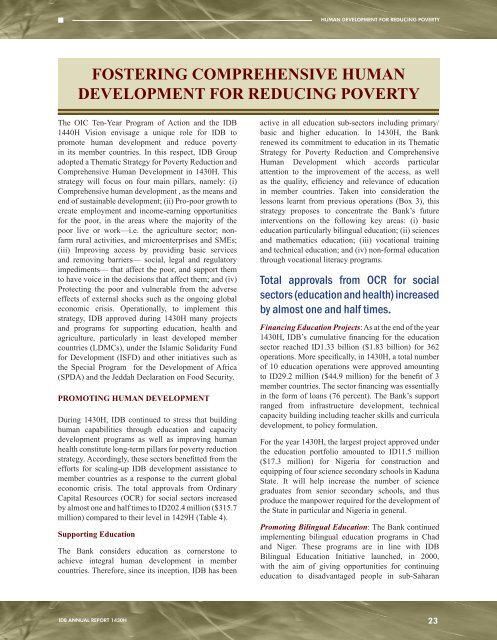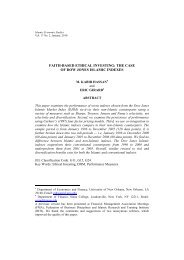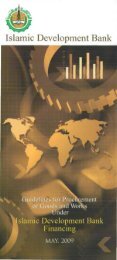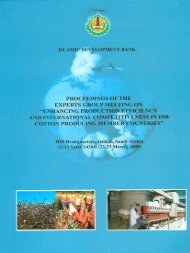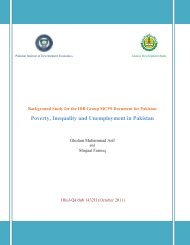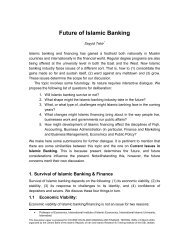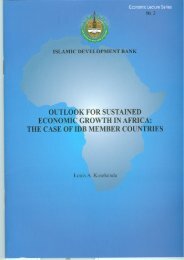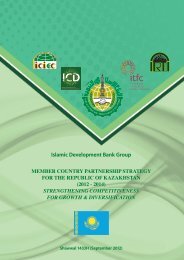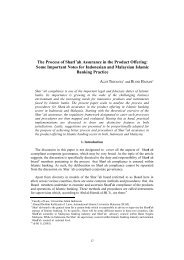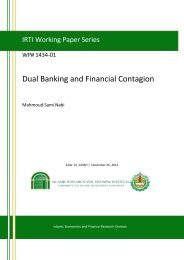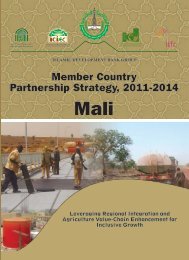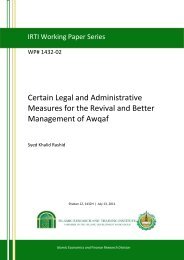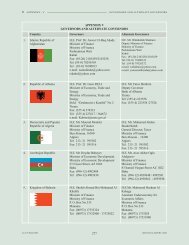35th 1430H - Islamic Development Bank
35th 1430H - Islamic Development Bank
35th 1430H - Islamic Development Bank
You also want an ePaper? Increase the reach of your titles
YUMPU automatically turns print PDFs into web optimized ePapers that Google loves.
HUMAN DEVELOPMENT FOR REDUCING POVERTYFOSTERING COMPREHENSIVE HUMANDEVELOPMENT FOR REDUCING POVERTYThe OIC Ten-Year Program of Action and the IDB1440H Vision envisage a unique role for IDB topromote human development and reduce povertyin its member countries. In this respect, IDB Groupadopted a Thematic Strategy for Poverty Reduction andComprehensive Human <strong>Development</strong> in <strong>1430H</strong>. Thisstrategy will focus on four main pillars, namely: (i)Comprehensive human development , as the means andend of sustainable development; (ii) Pro-poor growth tocreate employment and income-earning opportunitiesfor the poor, in the areas where the majority of thepoor live or work—i.e. the agriculture sector; nonfarmrural activities, and microenterprises and SMEs;(iii) Improving access by providing basic servicesand removing barriers— social, legal and regulatoryimpediments— that affect the poor, and support themto have voice in the decisions that affect them; and (iv)Protecting the poor and vulnerable from the adverseeffects of external shocks such as the ongoing globaleconomic crisis. Operationally, to implement thisstrategy, IDB approved during <strong>1430H</strong> many projectsand programs for supporting education, health andagriculture, particularly in least developed membercountries (LDMCs), under the <strong>Islamic</strong> Solidarity Fundfor <strong>Development</strong> (ISFD) and other initiatives such asthe Special Program for the <strong>Development</strong> of Africa(SPDA) and the Jeddah Declaration on Food Security.PROMOTING HUMAN DEVELOPMENTDuring <strong>1430H</strong>, IDB continued to stress that buildinghuman capabilities through education and capacitydevelopment programs as well as improving humanhealth constitute long-term pillars for poverty reductionstrategy. Accordingly, these sectors benefitted from theefforts for scaling-up IDB development assistance tomember countries as a response to the current globaleconomic crisis. The total approvals from OrdinaryCapital Resources (OCR) for social sectors increasedby almost one and half times to ID202.4 million ($315.7million) compared to their level in 1429H (Table 4).Supporting EducationThe <strong>Bank</strong> considers education as cornerstone toachieve integral human development in membercountries. Therefore, since its inception, IDB has beenactive in all education sub-sectors including primary/basic and higher education. In <strong>1430H</strong>, the <strong>Bank</strong>renewed its commitment to education in its ThematicStrategy for Poverty Reduction and ComprehensiveHuman <strong>Development</strong> which accords particularattention to the improvement of the access, as wellas the quality, efficiency and relevance of educationin member countries. Taken into consideration thelessons learnt from previous operations (Box 3), thisstrategy proposes to concentrate the <strong>Bank</strong>’s futureinterventions on the following key areas: (i) basiceducation particularly bilingual education; (ii) sciencesand mathematics education; (iii) vocational trainingand technical education; and (iv) non-formal educationthrough vocational literacy programs.Total approvals from OCR for socialsectors (education and health) increasedby almost one and half times.Financing Education Projects: As at the end of the year<strong>1430H</strong>, IDB’s cumulative financing for the educationsector reached ID1.33 billion ($1.83 billion) for 362operations. More specifically, in <strong>1430H</strong>, a total numberof 10 education operations were approved amountingto ID29.2 million ($44.9 million) for the benefit of 3member countries. The sector financing was essentiallyin the form of loans (76 percent). The <strong>Bank</strong>’s supportranged from infrastructure development, technicalcapacity building including teacher skills and curriculadevelopment, to policy formulation.For the year <strong>1430H</strong>, the largest project approved underthe education portfolio amounted to ID11.5 million($17.3 million) for Nigeria for construction andequipping of four science secondary schools in KadunaState. It will help increase the number of sciencegraduates from senior secondary schools, and thusproduce the manpower required for the development ofthe State in particular and Nigeria in general.Promoting Bilingual Education: The <strong>Bank</strong> continuedimplementing bilingual education programs in Chadand Niger. These programs are in line with IDBBilingual Education Initiative launched, in 2000,with the aim of giving opportunities for continuingeducation to disadvantaged people in sub-SaharanIDB ANNUAL REPORT <strong>1430H</strong> 23


